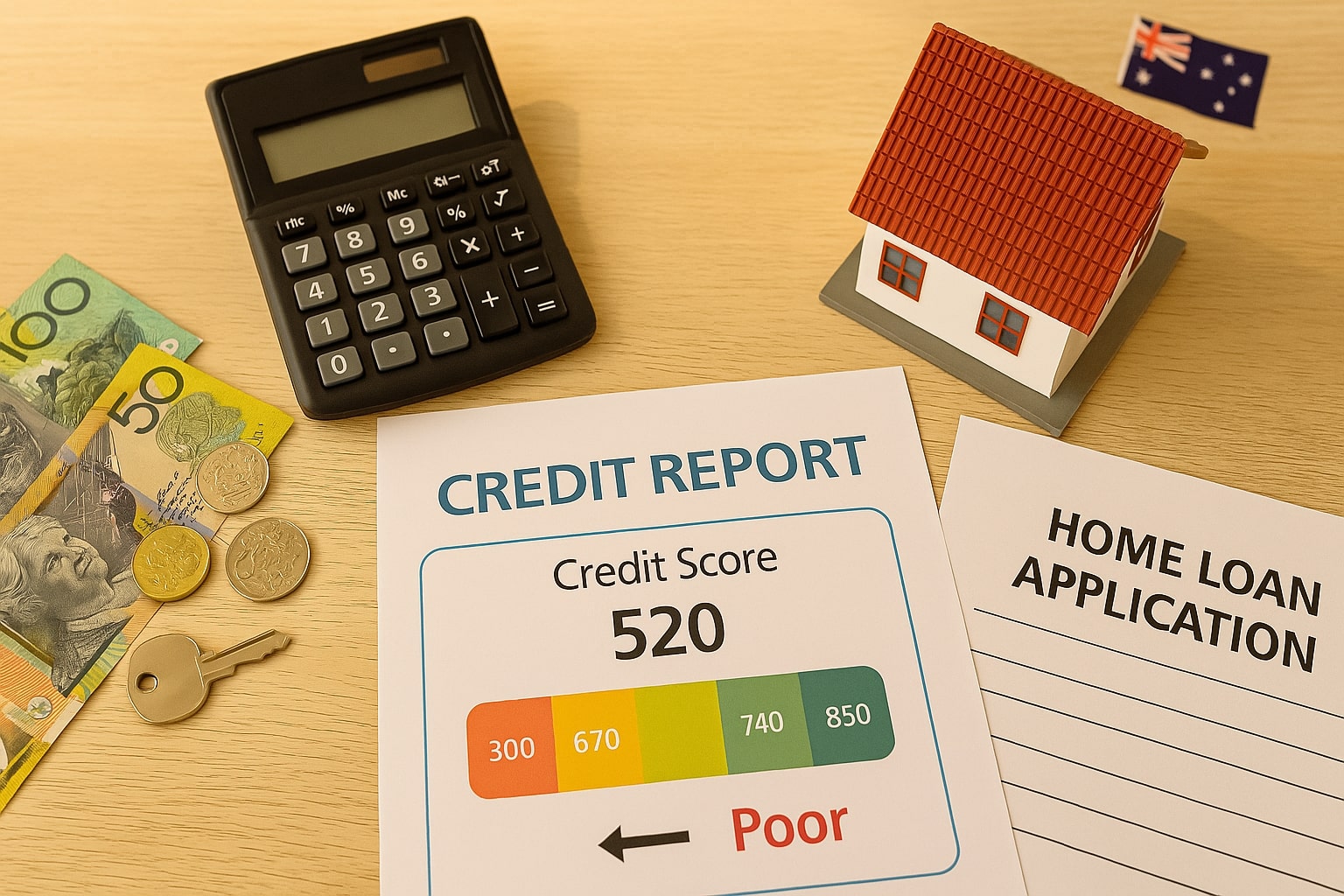Unlike countries such as the United States where FICO scores dominate, Australia utilizes three main credit reporting agencies—Equifax, Experian, and Illion—each with their own scoring systems and scales. This diversity can create confusion for prospective homebuyers trying to understand where they stand.
| Credit Agency | Score Range | Good Score | Excellent Score |
|---|---|---|---|
| Equifax | 0-1200 | 661-734 | 735+ |
| Experian | 0-1000 | 625-699 | 700+ |
| Illion | 0-1000 | 500-699 | 700+ |
Australian credit scores are calculated based on your credit history, which includes:
- Payment history on loans and credit cards
- Credit inquiries
- Outstanding debts
- Types of credit used
- Public records such as bankruptcies
- Age of credit accounts
Minimum Credit Score Requirements for Australian Home Loans
Standard Lenders (Banks and Major Financial Institutions)
Most mainstream lenders in Australia prefer applicants with credit scores between 650 and 700 (on average across scoring systems). This represents a “good” credit rating that suggests reliable financial behavior and lower lending risk.
Traditional lenders typically follow these general guidelines:
- 700+: Excellent approval chances with competitive interest rates
- 650-700: Good approval chances with standard interest rates
- 600-650: Possible approval with potential rate increases
- 550-600: Challenging approval process with higher interest rates likely
- Below 550: Very difficult to secure traditional financing
Specialist and Non-Conforming Lenders
For Australians with lower credit scores, specialist lenders offer alternative pathways to homeownership:
- 540-600: Several specialist lenders consider applications in this range, though with stricter conditions
- 510-540: Limited options with non-conforming lenders, significantly higher interest rates
- Below 510: Extremely challenging to secure any mortgage; may require substantial deposits (30%+) and significantly higher interest rates
How Credit Scores Affect Your Mortgage Terms
Your credit score doesn’t just determine approval—it significantly impacts the terms of your loan:
| Credit Score Range | Likely Impact on Mortgage Terms |
|---|---|
| Excellent (700+) | Access to the lowest interest rates, higher borrowing capacity, lower deposit requirements (potentially as low as 5-10%) |
| Good (600-700) | Standard interest rates, conventional borrowing capacity, typical deposit requirements (10-20%) |
| Fair (550-600) | Higher interest rates (0.5-1% above standard), reduced borrowing capacity, larger deposit requirements (15-20%) |
| Poor (Below 550) | Significantly higher interest rates (2%+ above standard), substantially reduced borrowing capacity, large deposit requirements (20-30%+) |
The Current Lending Environment in Australia (2025)
The Australian housing market has experienced significant changes in recent years. Following the interest rate increases of 2022-2024, lenders have become more cautious in their approval processes. Current trends indicate:
- Greater scrutiny of living expenses and discretionary spending
- Increased importance of consistent saving habits
- Tighter assessment of existing debts and liabilities
- More conservative property valuations
These factors mean that credit scores have become even more crucial in the home loan approval process, with many lenders raising their minimum score requirements since 2023.
Beyond Your Credit Score: What Lenders Actually Consider
While your credit score is important, Australian lenders evaluate mortgage applications based on multiple factors:
Key Assessment Factors
- Income stability and adequacy – Consistent employment history (ideally 6+ months in current role, 2+ years in the same industry)
- Deposit size – Larger deposits (20%+) can sometimes offset credit concerns
- Debt-to-income ratio – Total debt payments should typically not exceed 30-35% of gross income
- Genuine savings history – Demonstrated ability to save over time (minimum 3-6 months)
- Property characteristics – Location, size, and type affect lending risk assessment
- Living expenses – Realistic declaration of ongoing living costs
Red Flags That Concern Lenders Regardless of Credit Score
- Recent defaults or missed payments
- Multiple credit inquiries in a short timeframe
- Maxed-out credit cards or high credit utilization
- Unstable employment history
- Insufficient genuine savings
Strategies to Improve Your Credit Score for Home Buying
If your credit score falls below the ideal range, consider these proven strategies to improve it before applying:
Short-Term Improvements (3-6 months)
- Correct errors on your credit report – Request reports from all three agencies and dispute any inaccuracies
- Pay down existing debts – Reduce credit card balances to below 30% of available credit
- Avoid new credit applications – Each application can temporarily lower your score
- Set up automatic payments – Ensure no missed payments going forward
Medium-Term Improvements (6-12 months)
- Consolidate multiple debts – Simplify repayments and potentially reduce interest
- Maintain consistent saving habits – Demonstrate financial discipline
- Close unused credit accounts – Reduce your overall credit exposure
- Maintain stable employment – Avoid changing jobs if possible before applying
Long-Term Improvements (12+ months)
- Build a positive credit history – Make all payments on time and in full
- Diversify your credit mix – Responsibly manage different types of credit
- Increase your income – Seek promotions or additional income streams
- Save for a larger deposit – Aim for 20%+ to avoid Lenders Mortgage Insurance
Loan Options for Different Credit Score Scenarios
Excellent Credit Score (700+)
- Standard home loans with competitive interest rates
- Low deposit options (potentially down to 5-10%)
- Interest-only periods more readily available
- Flexible features including offset accounts and redraw facilities
Good Credit Score (600-700)
- Standard home loans with average market rates
- Lenders Mortgage Insurance (LMI) likely required for deposits under 20%
- Most loan features available but may have higher qualification requirements
Fair Credit Score (550-600)
- Specialist lenders rather than major banks
- Higher interest rates (typically 0.5-2% above standard rates)
- Larger deposit requirements (15-20% minimum)
- Limited loan features with potential restrictions
Poor Credit Score (Below 550)
- Non-conforming lenders specializing in credit-impaired borrowers
- Significantly higher interest rates (2%+ above standard rates)
- Substantial deposit requirements (25-30%+)
- Minimal loan features and stricter terms
- Potential for interest rate reductions after 1-2 years of perfect repayments
How to Check Your Credit Score in Australia
Before applying for a home loan, check your credit score through these free services:
- Equifax: www.equifax.com.au
- Experian: www.experian.com.au
- Illion: Access through Credit Simple
Checking your own score does not impact your credit rating, and it’s advisable to check all three as lenders may use different agencies.
Conclusion
While there is no absolute minimum credit score for buying a house in Australia, most successful applicants maintain scores of 650 or higher. However, options exist for those with lower scores through specialist lenders, albeit with less favorable terms.
The most effective approach is to understand your current credit position well before applying for a home loan, work proactively to improve your score if needed, and consider seeking professional advice from a mortgage broker who specializes in your specific circumstances. With proper preparation, even those with credit challenges can find pathways to homeownership in Australia.
This guide was last updated April 2025. Credit requirements may change based on economic conditions and lender policies.



